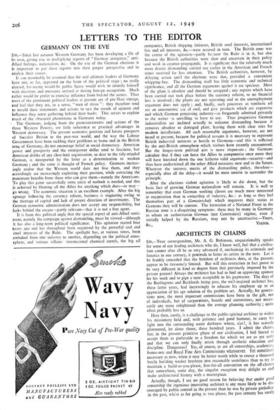LETTERS TO THE EDITOR
GERMANY ON THE EVE
Sta,—Since last autumn Western Germany has been developing a life of Its own, giving rise to multiplying reports of "German arrogance," anti- Allied feelings, nationalism, &c. On the eve of the German elections it Is important to put these reports into their proper perspective and to analyse their causes.
It can reasonably be assumed that the real ultimate leaders of Germany have not, so far, appeared on the front of the political stage ; no really shrewd, far-seeing would-be public figure would wish to identify himself with decisions and measures arrived at during foreign occupation. Much rather would he prefer to exercise influence from behind the scenes. Thus most of the prominent political leaders at present are of pre-Nazi vintage, and feel that they arc, in a sense, "men of straw ": they therefore tend to mould their statements and actions to sua the trends of opinion and Influence they sense gathering behind their backs. This serves to explain much of the obscured phenomena In Germany today.
The Germans, judging from the pronouncements and actions of the three Western Powers, see little coherence or practical advantages in Western democracy. The present economic position and future prospects of Socialist Britain in the post-war world, and the way the Labour Government have been tackling their problems at home and in the British zone of Germany, do not encourage belief in social democracy. American power and prosperity and the omnipotent dollar tend to fascinate, but American dislike of any close-knit organisation, so dear to the tidy-minded German, is interpreted by the latter as a determination to weaken Germany ; and the same is thought of French policy. Germans increas- ingly realise that the Western world dare not lose them, and they accordingly arc increasingly exploiting their position, while extracting the maximum benefits from those who can give them—namely the Americans. To play this game successfully some unity of outlook is needed, and this js achieved by blaming all the Allies for anything which does—or may— go wrong. The economic situation is an excellent example. After the big upsurge following the currency reform, business is stagnating owing to the shortage of capital and lack of proper direction of investments. The German economic administration does not accept any responsibility, but lurks behind the excuse—partly relevant—that it is not a free agent.
It is from this political angle that the special aspect of anti-Allied senti- ment, namely the campaign against dismantling, must be viewed—although It has also a long-term political significance. This agitation started four sycars ago and has throughout been organised by the powerful coal and steel interests of the Ruhr. The spotlight has, at various times, been switohed from one industry to another, depending on the political atmo- sphere, and various villains-- international chemical cartels, the big oil companies, British shipping interests, British steel interests, international fats and oil interests, &c.—were accused in turn. The British zone was the centre of the agitation—partly because the Ruhr is in it, but also because the British authorities were slow and uncertain in their policy and weak in counter-propaganda. It is significant that the relatively much more drastic dismantling carried out earlier in the American and French zones received far less attention. The British authorities, however, by delaying action until the elections were due, provided a convenient whipping-boy. The dismantling itself has little economic and technical significance, and all the German arguments against it are specious. Most of the plant is obsolete and should be scrapped ; any repairs which have been carried out took place before the currency reform, so no financial loss is involved ; the plants are not operating and so the unemployment argument does not apply ; and, finally, such processes as synthetic oil are an uneconomic use of coal, and give products which are expensive and which German processing industry—as frequently admitted privately to the writer—is unwilling to have to use. Thus progressive German industrialists are inclined actually to welcome dismantling because it removes obsolete or damaged plant, leaving them with clear sites for modern installations. All such reasonable arguments, however, arc not beard at present, because for political reasons it is necessary to represent British industrial interests as hostile to Germany—and this is reflected by the anti-British atmosphere which visitors have recently encountered. But the longer-term political aim is more important ; the Germans calculate that if they can force the Allies to compremisc once more they will have knocked down the one hitherto valid argument—security—and thus have undermined all the other Allied measures now and in the future. Whatever the intrinsic merits of the dismantling policy, therefore— especially after all the delay—it would be most unwise to surrender the principle.
After the elections violent agitation is likely to die down, but the basic fact of growing German nationalism will remain. It is well to remember that even German working classes arc much more interested in organisation than in ownership of industry, &c.: as long as they feel themselves part of a Gemeinschof t which improves their status as Germans they will be content. The formation of a National Front in the Russian zone is a disquieting symptom: there may be many in Germany to whom an authoritarian German (not Communist) regime, even if initially helped by the Russians, may not be unattractive.—Yours,






























 Previous page
Previous page